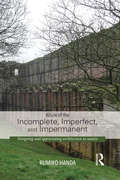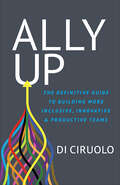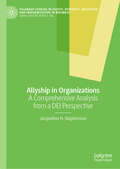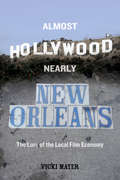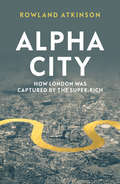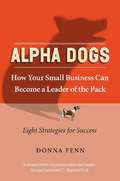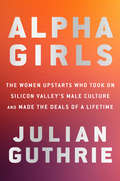- Table View
- List View
Alltagsintelligenz: 24 Tools für Ihren täglichen Erfolg
by Marion Lemper-Pychlau Sonja Schneider-BlümchenDie üblichen Bewältigungsmechanismen reichen häufig kaum mehr aus, um den komplexen Anforderungen in Beruf und Gesellschaft gerecht zu werden und dabei die eigenen Ziele aktiv im Blick zu behalten Dieser Ratgeber bietet neue Impulse für ein ganzheitliches Selbstmanagement und gibt dem Leser 24 leicht umsetzbare Lösungen an die Hand, um mit den überbordenden Anforderungen des leistungsorientierten Informationszeitalters zurechtzukommen und sich die Regie über das eigene Leben zurückzuholen. Die Autorinnen begleiten das Buch mit einem interaktiven Blog. Die Leser sind eingeladen, Ihre Erfahrungen dort mitzuteilen und weitere Anregungen für ein bewusstes und selbstbestimmtes Leben zu erhalten
Alltech
by Natalie Kindred David E. BellAlltech was a Lexington, Kentucky–based producer of supplements for animal feed, with revenues of over $2 billion (projected to reach $3 billion in 2018), sales in 120 countries, 5,000 employees, and 100 manufacturing plants worldwide. For nearly four decades, Alltech had been defined by its focus on innovation and marketing as well as the entrepreneurial spirit and vision of its founder, Dr. Pearse Lyons, who remained intimately involved in company operations and in managing relationships with key customers. This case finds Alltech in the midst of a new growth strategy—downstream integration, specifically buying up feed companies—which marked a stark departure from the company’s longtime emphasis on organic growth. The decision to buy feed companies had been controversial within Alltech: feed was a low-margin, rather traditional commodity business, while Alltech earned relatively high margins on products rooted in science and innovation. However, Lyons believed downstream integration would allow Alltech to better communicate with its end customers (farmers), increase sales of its supplements, and help protect the firm from industry dynamics such as consolidation and cost pressure. Was he right, or should Alltech take a different approach?
Alltech...naturally
by David E. Bell Mary ShelmanEntrepreneur Pearse Lyons had built Alltech into the fastest growing company in the global animal health industry through innovative technology, creative marketing, and strong branding. Sel-Plex, a proprietary Alltech product, had shown important health benefits for animals and humans. Although numerous branded selenium-enriched products were being sold in supermarkets around the world, the company's current business model (selling Sel-Plex as an ingredient) did not allow it to participate in the value created. Lyons and Alltech's directors must choose between three different options for Sel-Plex, which include continuing with the current strategy, partnering with animal producers, or marketing Sel-Plex directly to consumers in tablet form.
Allure of the Incomplete, Imperfect, and Impermanent: Designing and Appreciating Architecture as Nature
by Rumiko HandaArchitects have long operated based on the assumption that a building is 'complete' once construction has finished. Striving to create a perfect building, they wish for it to stay in its original state indefinitely, viewing any subsequent alterations as unintended effects or the results of degeneration. The ideal is for a piece of architecture to remain permanently perfect and complete. This contrasts sharply with reality where changes take place as people move in, requirements change, events happen, and building materials are subject to wear and tear. Rumiko Handa argues it is time to correct this imbalance. Using examples ranging from the Roman Coliseum to Japanese tea rooms, she draws attention to an area that is usually ignored: the allure of incomplete, imperfect and impermanent architecture. By focusing on what happens to buildings after they are ‘complete’, she shows that the ‘afterlife’ is in fact the very ‘life’ of a building. However, the book goes beyond theoretical debate. Addressing professionals as well as architecture students and educators, it persuades architects of the necessity to anticipate possible future changes and to incorporate these into their original designs.
Ally Up: The Definitive Guide to Building More Inclusive, Innovative, & Productive Teams
by Di CiruoloAlly Up teaches what every business should know about diversity, equity, and inclusion.
Allyn Abbott Young (Great Thinkers in Economics)
by Ramesh ChandraAllyn Young (1876-1929) was a deep thinker and achieved fame during his lifetime. His fame owes more to his style and influence as a teacher than his published work. His greatest fame as an author rests on a single economic paper on increasing returns and economic progress but he contributed much more as a mentor to his graduate students such as Frank Knight, Edward Chamberlin, and Lauchlin Currie at Harvard and to the undergraduate Nicholas Kaldor at the London School of Economics. He shot into international fame for his role as a member of the American delegation led by President Woodrow Wilson to negotiate peace at Paris after WWI. However, recent interest in Young is more due to his thought than to his contribution to the economics profession or public service. At the time of his death, he was working on two treatises, one on Money and the other on Economics. The one on Money was at a fairly advanced stage but no trace of either was found in his family’s hasty departure from London after his untimely death. There is a general dearth of published material about Young, his thought and his life. His economic thought, apart from his views on growth theory and monetary economics, is relatively unknown. This volume offers a thematic approach to his contributions and biography.
Allyship in Organizations: A Comprehensive Analysis from a DEI Perspective (Palgrave Studies in Equity, Diversity, Inclusion, and Indigenization in Business)
by Jacqueline H. StephensonThis book provides a comprehensive analysis of the issues surrounding allyship as one of the tools in the arsenal of organisational leaders to further advance the goal of diversity, equity and inclusion (DEI) in organisations. It extends the existing literature on allyship, which has predominantly focused on allyship in the context of gender and racial inclusion. It specifically addresses allyship concerns within organizations that are striving for DEI. The chapters explore various models of allyship, delving into the antecedents, moderators, mediators, and organizational outcomes associated with effective allyship in the pursuit of DEI goals. This text critically examines the concept of allyship in the context of discrimination faced by various groups, including but not limited to under-researched populations such as persons with disabilities and individuals from the lesbian, gay, bisexual, and queer (LGBQ) community. By extending the understanding of human resource practitioners and academic theorists in these underexplored but crucial areas, it sheds light on the role of organisational allies in addressing discrimination and supporting marginalized groups. Additionally, it delves into the involvement of organisational allies in adjudicated discrimination cases, further enriching the discourse on allyship and its practical applications. Providing a comprehensive review of the salient issues surrounding allyship within organisations and the extent to which this can be an efficacious approach in promoting and developing more inclusive and diverse contemporary organisations, this work will prove useful to researchers in facilitating the delivery of contemporary data, literature and analysis as it relates to the current challenges faced by disadvantaged employees and job seekers and how lenses through which they are perceived, may be prejudicial.
Almarai Company: Milk and Modernization in the Kingdom of Saudi Arabia
by Natalie Kindred Esel Cekin Kristin E. Fabbe Safwan Al-AminCase
Almarai Company: Milk and Modernization in the Kingdom of Saudi Arabia
by Natalie Kindred Esel Cekin Kristin E. Fabbe Safwan Al-AminWith SAR 14 billion ($3.7 billion) in 2017 revenues, Almarai was Saudi Arabia's largest dairy producer, distributor, and marketer, with a large portfolio of branded dairy products, juices, bakery goods, and infant formula and a sales presence across the Gulf region, Jordan, and Egypt. Almarai employed some 42,000 people across its operations, from its massive dairy farms to its processing plants to its vast sales and distribution operation that reached over 100,000 outlets. Notwithstanding its diverse portfolio, the core of Almarai's business was (1) sales of branded fresh/chilled dairy products, (2) in Saudi Arabia, (3) distributed through the traditional retail channel made up of thousands of small neighborhood shops called bakalas. In October 2018, all three of these focal points were under pressure. Under the economic-restructuring programs of Saudi Arabia's new crown prince, Mohammed bin Salman, new taxes and subsidy cuts were squeezing household budgets. Concurrently, changes to other government policies were causing expatriates-who made up about a third of Saudi Arabia's population and were a key consumer of Almarai's dairy products-to leave the country in droves. This case finds Almarai's management team, led by soon-to-retire CEO Georges Schorderet, debating how the company can defend and grow its position in Saudi Arabia while also finding new sources of future growth (e.g., bringing its production model to new markets with fragmented dairy sectors or entering new product categories such as fish or ice cream). The decision of how to move forward will be based on an assessment of Almarai's strengths, how they can be best used to drive future growth, and how relevant they will remain in a market that is changing so dramatically.
Almarai Company: Milk and Modernization in the Kingdom of Saudi Arabia
by Natalie Kindred Esel Cekin Kristin E. FabbeWith SAR 14 billion ($3.7 billion) in 2017 revenues, Almarai was Saudi Arabia's largest dairy producer, distributor, and marketer, with a large portfolio of branded dairy products, juices, bakery goods, and infant formula and a sales presence across the Gulf region, Jordan, and Egypt. Almarai employed some 42,000 people across its operations, from its massive dairy farms to its processing plants to its vast sales and distribution operation that reached over 100,000 outlets. Notwithstanding its diverse portfolio, the core of Almarai's business was (1) sales of branded fresh/chilled dairy products, (2) in Saudi Arabia, (3) distributed through the traditional retail channel made up of thousands of small neighborhood shops called bakalas. In October 2018, all three of these focal points were under pressure. Under the economic-restructuring programs of Saudi Arabia's new crown prince, Mohammed bin Salman, new taxes and subsidy cuts were squeezing household budgets. Concurrently, changes to other government policies were causing expatriates-who made up about a third of Saudi Arabia's population and were a key consumer of Almarai's dairy products-to leave the country in droves. This case finds Almarai's management team, led by soon-to-retire CEO Georges Schorderet, debating how the company can defend and grow its position in Saudi Arabia while also finding new sources of future growth (e.g., bringing its production model to new markets with fragmented dairy sectors or entering new product categories such as fish or ice cream). The decision of how to move forward will be based on an assessment of Almarai's strengths, how they can be best used to drive future growth, and how relevant they will remain in a market that is changing so dramatically.
Almonds
by Rafel Socias i Company Thomas M. GradzielThis book provides a comprehensive overview of almond growing from a scientific and horticultural perspective, covering botany, production, processing and industrial uses. Almonds are an important crop; they are highly regarded for their flavour, nutritional properties and culinary uses, and almond oil is used widely in food, cosmetic and pharmaceutical production. They are easy to transport and have long storability, facilitating global dissemination. Demand is constantly increasing and global production has more than doubled in the last 20 years. The popularity of almonds and the increase in demand has required new plantings and a response to ongoing changes in cultural and climatic conditions. Almonds: Botany, Production and Uses meets the need for up-to-date information on this crop and covers: #65533; botany and taxonomy #65533; cultivation, genetics and breeding #65533; propagation, orchard management and harvesting #65533; pests and diseases #65533; nutrition, marketing and utilization Authored by an international team of experts and presented in full colour throughout, this book is an essential resource for academic researchers and extension workers, as well as growers, orchard managers and industry personnel.
Almost All About Unit Roots
by In ChoiMany economic theories depend on the presence or absence of a unit root for their validity, and econometric and statistical theory undergo considerable changes when unit roots are present. Thus, knowledge on unit roots has become so important, necessitating an extensive, compact, and nontechnical book on this subject. This book is rested on this motivation and introduces the literature on unit roots in a comprehensive manner to both empirical and theoretical researchers in economics and other areas. By providing a clear, complete, and critical discussion of unit root literature, In Choi covers a wide range of topics, including uniform confidence interval construction, unit root tests allowing structural breaks, mildly explosive processes, exuberance testing, fractionally integrated processes, seasonal unit roots and panel unit root testing. Extensive, up to date, and readily accessible, this book is a comprehensive reference source on unit roots for both students and applied workers.
Almost Ethical: Waking Up to Compromise
by Clinton D. Korver Ronald A. HowardEthical compromises both big and small hurt us, and we underestimate how much. One compromise can lead to another as we let our standards slip, and compromises can create barriers in relationships or become a burden as they erode our sense of integrity. But we can learn to avoid this lowly road-a road we often choose out of ignorance, carelessness, or just plain convenience. We can choose to spot temptations early and use our newfound awareness as a foundation for skillful ethical decision making.
Almost Hollywood, Nearly New Orleans
by Vicki MayerAt publication date, a free ebook version of this title will be available through Luminos, University of California Press's Open Access publishing program. Visit www. luminosoa. org to learn more. Early in the twenty-first century, Louisiana, one of the poorest states in the United States, redirected millions in tax dollars from the public coffers in an effort to become the top location site globally for the production of Hollywood films and television series. Why would lawmakers support such a policy? Why would citizens accept the policy's uncomfortable effects on their economy and culture? Almost Hollywood, Nearly New Orleans addresses these questions through a study of the local and everyday experiences of the film economy in New Orleans, Louisiana--a city that has twice pursued the goal of becoming a movie production capital. From the silent era to today's Hollywood South, Vicki Mayer explains that the aura of a film economy is inseparable from a prevailing sense of home, even as it changes that place irrevocably.
Alnylam Pharmaceuticals: Building Value from the IP Estate (B)
by Matt Higgins Willy Shih Vicki L. SatoThe leader of a pioneering biotech company in the siRNA space weighs his options for scaling production capacity in advance of an anticipated commercial launch. Operational complexity and relative merits of in-house manufacturing versus a contractor model are discussed.
Along Different Lines: 70 Real Life Railway Stories
by Geoff Body Bill ParkerRunning a railway is a complex business. However well-run it is there will always be surprises, often hilarious, frequently unexpected, sometimes serious. Here railway professionals recall notable incidents from across their careers on the railways, lovingly compiled by expert railwaymen and authors Geoff Body and Bill Parker. The incidents covered in this illustrated book include such bizarre ‘everyday’ events as coping with hurricanes, rogue locomotives and runaway wagons, PR successes and otherwise, the Brighton Belle, Flying Scotsman and Mallard, training course capers, a wino invasion, trackside antics, the Eurostar backdrop, the birth of a prison, and royal and other special occasions. An enjoyable look back at life on the railways.
Alpen Bank: Launching the Credit Card in Romania (Brief Case)
by V. Kasturi Rangan Sunru YongIn 2006, the country manager for Alpen Bank in Romania, Gregory Carle, considers whether to recommend the launch of a credit card business. The firm rejected the idea several years earlier because of poor economic conditions in Romania. However, Romania is experiencing a period of economic growth after joining the European Union and Carle believes it is time to reconsider the opportunity despite continued skepticism within the company. Carle faces several important decisions before he can present his plan to the head of International Consumer Businesses. He must decide whether to launch a credit card business in Romania, how to position the credit card, and how to acquire new customers most effectively. This case is appropriate for use in the product policy module of a general marketing course, in a new product course, or in a services management course. Students are required to complete a quantitative assignment as part of case analysis.
Alpen Bank: Launching the Credit Card in Romania (Brief Case)
by V. Kasturi Rangan Sunru YongIn 2006, the country manager for Alpen Bank in Romania, Gregory Carle, considers whether to recommend the launch of a credit card business. The firm rejected the idea several years earlier because of poor economic conditions in Romania. However, Romania is experiencing a period of economic growth after joining the European Union and Carle believes it is time to reconsider the opportunity despite continued skepticism within the company. Carle faces several important decisions before he can present his plan to the head of International Consumer Businesses. He must decide whether to launch a credit card business in Romania, how to position the credit card, and how to acquire new customers most effectively. This case is appropriate for use in the product policy module of a general marketing course, in a new product course, or in a services management course. Students are required to complete a quantitative assignment as part of case analysis.
Alpha City: How London Was Captured by the Super-Rich
by Rowland AtkinsonHow London was bought and sold by the Super-Rich, and what it means for the rest of us Who owns London? In recent decades, it has fallen into the hands of the super-rich. It is today the essential &“World City&” for High-Net-Worth Individuals and Ultra-High-Net-Worth Individuals. Compared to New York or Tokyo, the two cities that bear the closest comparison, it has the largest number of wealthy people per head of population. Taken as a whole, London is the epicentre of the world&’s finance markets, an elite cultural hub, and a place to hide one&’s wealth. Rowland Atkinson presents a history of the property boom economy, going back to the end of Empire. It tells the story of eager developers, sovereign wealth and grasping politicians, all paving the way for the wealthy colonisation of the cityscape. The consequences of this transformation of the capital for capital is the brutal expulsion of the urban poor, austerity, cuts, demolitions, and a catalogue of social injustices. This Faustian pact has resulted in the sale and destruction of public assets, while the rich turn a blind eye toward criminal money laundering to feather their own nests. Alpha City moves from gated communities and the mega-houses of the super-rich to the disturbing rise of evictions and displacements from the city. It shows how the consequences of widening inequality have an impact on the urban landscape.
Alpha Dogs
by Donna FennTake an ordinary business. A bike shop. An auction company. An ice cream parlor. A sock manufacturer. In thoroughly mundane businesses like these, an entrepreneur must outsmart the multitudes of competitors, leap to the head of the pack, and become a dominant Alpha Dog. Exactly how does an everyday company distinguish itself in the marketplace, generate much higher sales than its competitors, and earn the lasting loyalty of customers and employees? Is it cutting-edge products? Brilliant service? Ingenious branding? Donna Fenn, a twenty-year veteran of Inc. magazine, has discovered the people who have the answers. In a personal and probing style, she introduces you to eight Alpha Dogs. These men and women share their solutions and insights on how to rise to the top, despite multiple competitors, from Chinese manufacturers to Wal-Mart. Readers will meet: Chris Zane, an intense, ambitious father of three boys. His Branford, Connecticut, retail bike shop has flourished among Wal-Mart, Sports Authority, and independent bike stores. He's done it by seeking out new markets and perfecting the art of customer service. Deb Weidenhamer, a tough woman in a male-dominated industry who transformed a traditional auction company with cutting-edge technology. While her competitors were still fretting about eBay, she was using the online auction giant as a training ground for her own innovative Web site. Amy Simmons, a former premed student who fell in love with the ice cream business in Boston and then founded her own ice cream parlor in Austin, Texas. With twelve Amy's Ice Creams stores in Austin, Amy's is the Austin hometown favorite, despite her deep-pocketed rivals, Ben & Jerry's and Cold Stone Creamery. In accessible, conversational style, Donna Fenn tells each entrepreneur's personal story, shares their winning formulas, and offers nuts-and-bolts advice and practical tips. Alpha Dogs is a lively handbook for every current and aspiring entrepreneur.
Alpha Girls: The Women Upstarts Who Took On Silicon Valley's Male Culture and Made the Deals of a Lifetime
by Julian GuthrieAn unforgettable story of four women who, through grit and ingenuity, became stars in the cutthroat, high-stakes, male dominated world of venture capital in Silicon Valley, and helped build some of the foremost companies of our time. In Alpha Girls, award-winning journalist Julian Guthrie takes readers behind the closed doors of venture capital, an industry that transforms economies and shapes how we live. We follow the lives and careers of four women who were largely written out of history - until now. Magdalena Yesil, who arrived in America from Turkey with $43 to her name, would go on to receive her electrical engineering degree from Stanford, found some of the first companies to commercialize internet access, and help Marc Benioff build Salesforce. Mary Jane Elmore went from the corn fields of Indiana to Stanford and on to the storied venture capital firm IVP - where she was one of the first women in the U.S. to make partner - only to be pulled back from the glass ceiling by expectations at home. Theresia Gouw, an overachieving first-generation Asian American from a working-class town, dominated the foosball tables at Brown (she would later reluctantly let Sergey Brin win to help Accel Partners court Google), before she helped land and build companies including Facebook, Trulia, Imperva, and ForeScout. Sonja Hoel, a Southerner who became the first woman investing partner at white-glove Menlo Ventures, invested in McAfee, Hotmail, Acme Packet, and F5 Networks. As her star was still rising at Menlo, a personal crisis would turn her into an activist overnight, inspiring her to found an all-women's investment group and a national nonprofit for girls.These women, juggling work and family, shaped the tech landscape we know today while overcoming unequal pay, actual punches, betrayals, and the sexist attitudes prevalent in Silicon Valley and in male-dominated industries everywhere. Despite the setbacks, they would rise again to rewrite the rules for an industry they love. In Alpha Girls, Guthrie reveals their untold stories.
Alpha Girls: The Women Upstarts Who Took on Silicon Valley's Male Culture and Made the Deals of a Lifetime
by Julian GuthrieA Financial Times Summer Book of 2019'The addictive stories of four incredible women who did things their own way and rewrote the code of a whole industry' Emerald StreetDescribed as 'the book that the world needs right now' (Adam Fisher, author of Valley of Genius), Alpha Girls is perfect for fans of Hidden Figures, Lean In and The Social Network.Silicon Valley has long been at the forefront of innovation, but it is renowned for its archaic sexist culture. Alpha Girls is the unforgettable story how a group of talented women achieved success in a tech world run by 'bro-grammers' through sheer grit and determination. Despite the instrumental role they played in building some of the foremost companies of our time, these women have been written out of history - until now. In Alpha Girls, award-winning writer Julian Guthrie reveals their untold stories.*Magdalena Yesil who arrived in America from Turkey with $43 to her name and would go on to help Marc Benioff build Salesforce. *Mary Jane Elmore - one of the first women in the United States to make partner at a venture capital firm. *Theresia Gouw, who helped land and build companies including Facebook, Trulia, Imperva and ForeScout. *Sonja Hoel, the first woman investing partner at Menlo Ventures who invested in McAfee, Hotmail, Acme Packet and F5 Networks as well as founding an all-women's investment group and a national nonprofit for girls.These women, juggling work and family, shaped the tech landscape we know today while overcoming unequal pay, actual punches, betrayals and the sexist attitudes prevalent in Silicon Valley. Despite the setbacks, they would rise again to rewrite the rules for an industry they love.
Alpha Girls: The Women Upstarts Who Took on Silicon Valley's Male Culture and Made the Deals of a Lifetime
by Julian GuthrieA Financial Times Summer Book of 2019'The addictive stories of four incredible women who did things their own way and rewrote the code of a whole industry' Emerald StreetDescribed as 'the book that the world needs right now' (Adam Fisher, author of Valley of Genius), Alpha Girls is perfect for fans of Hidden Figures, Lean In and The Social Network.Silicon Valley has long been at the forefront of innovation, but it is renowned for its archaic sexist culture. Alpha Girls is the unforgettable story how a group of talented women achieved success in a tech world run by 'bro-grammers' through sheer grit and determination. Despite the instrumental role they played in building some of the foremost companies of our time, these women have been written out of history - until now. In Alpha Girls, award-winning writer Julian Guthrie reveals their untold stories.*Magdalena Yesil who arrived in America from Turkey with $43 to her name and would go on to help Marc Benioff build Salesforce. *Mary Jane Elmore - one of the first women in the United States to make partner at a venture capital firm. *Theresia Gouw, who helped land and build companies including Facebook, Trulia, Imperva and ForeScout. *Sonja Hoel, the first woman investing partner at Menlo Ventures who invested in McAfee, Hotmail, Acme Packet and F5 Networks as well as founding an all-women's investment group and a national nonprofit for girls.These women, juggling work and family, shaped the tech landscape we know today while overcoming unequal pay, actual punches, betrayals and the sexist attitudes prevalent in Silicon Valley. Despite the setbacks, they would rise again to rewrite the rules for an industry they love.
Alpha Male Syndrome: The Good, the Bad, the Ugly
by Kate Ludeman Eddie ErlandsonThis chapter introduces the concept of alpha male syndrome, promising tools and advice for alphas, their families, coworkers, and organizations to harness the immense power of alpha males while minimizing their potential downside.


